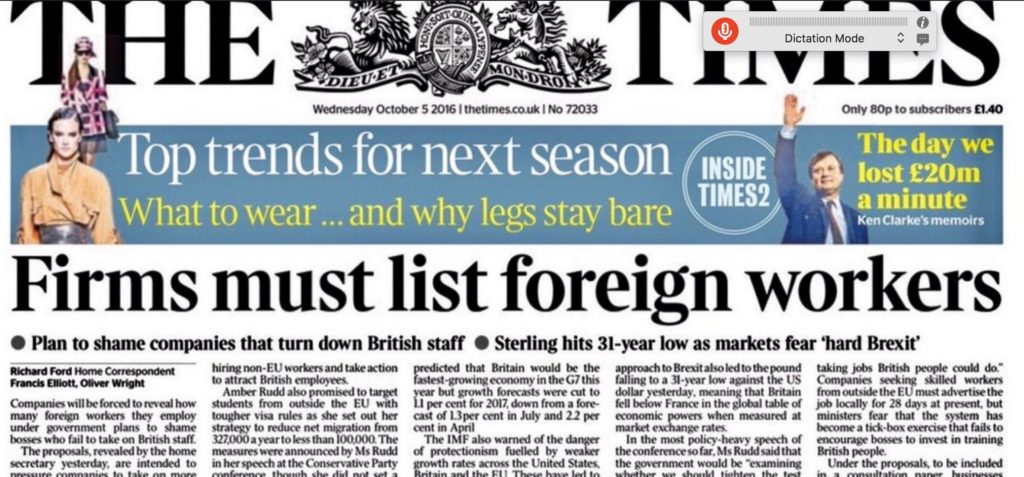
In 1939 there were about 140,000 Jews living in the Netherlands, including about 25,000 German Jews who had fled from Germany. By 1945, only about 35,000 of these people were alive. The Nazi extermination of Dutch Jews was remarkably efficient, mainly because Holland had been a well-administered state which kept very good records of its citizens, their addresses and their religions. So when the Nazis arrived, their genocidal task was easier than it was in some other occupied countries.
This horrific story neatly encapsulates the dilemma of the data-driven state. On the one hand, good governance requires that a state knows a lot about its citizens — where they live, what they do for a living, what taxes they pay, which schools their children can attend, and so on. Since 9/11, Western democracies have determined that the ‘war’ on terror (or the need to keep us safe, depending on your point of view) requires that the state needs to know an awful lot more about its citizens, and so comprehensive surveillance of their online and mobile communications, movements and financial transactions has been added to the government’s shopping list.
As we know from Edward Snowden and other sources, the scale and intrusiveness of this surveillance is now staggering. And — as the UK Investigatory Powers Bill shows, the state’s appetite for fine-grained personal data seems insatiable and is destined to grow.
Confronted with this new reality, one celebrated ex-spook remarked that we are “a keystroke away from totalitarianism”. What that means is that the information resources now available to states would be a godsend to an authoritarian regime that wasn’t restrained by constitutional niceties, civil liberties or human rights.
When one puts this point to spooks and government officials, however, their instinctive response is to pooh-pooh the idea. It may be technically true, they say, but — come on! — we live in a democracy and the chances of an authoritarian bully gaining power in such a polity are, well, infinitesimal.
Following the Brexit vote and Donald Trump’s ascendancy in the US presidential election, this complacency is beginning to look a bit strained.
Take the UK. It is, in general terms, a mature and stable democracy. And yet in the hours and days after the Brexit vote its government went into a meltdown from which it was only rescued by the emergence of the Home Secretary (a.k.a. Ministry of the Interior) as the sole survivor of a chaotic leadership competition in the governing party.
Meanwhile, on the other side of the Atlantic, a property-tycoon-cum-reality-TV-star who is unstable, narcissistic, racist, misogynistic, ignorant of world affairs, a proponent of torture and of deporting up to 11 million immigrants has come to within a hair’s-breadth of becoming President of the United States.
Contemplating this alarming possibility, optimists and realists both fall back on tropes about the extent to which presidential power is constrained by America’s constitutional structure. Trump may be terrible, they say, but the system would rein him in.
I wonder. And an interesting Reuters scoop this week illustrates the potential problem. It turns out that a government headed by a President who is a cautious legal scholar secretly compelled a major Internet company — Yahoo — to build a custom computer program to search all of its customers’ incoming emails for specific information provided by U.S. intelligence officials.
Just ponder that for a moment: an Internet company was forced to design and operate a bespoke, real-time email-wiretap service for the U.S. government.
“It remains unclear what form the directive took”, says The Intercept‘s report,
“though according to Andrew Crocker, an attorney with the Electronic Frontier Foundation, the best guess is that it invoked Section 702 of the Foreign Intelligence Surveillance Act, which permits the bulk collection of communications for the purpose of targeting a foreign individual.
But this Yahoo program doesn’t appear to have had even an ostensibly non-U.S. target. Rather, literally every single person with a Yahoo email inbox was evidently placed under surveillance, regardless of citizenship.
Even Prime Minister Theresa May might regard this as executive overreach — until the next terrorist outrage. But would President Trump? You only have to ask the question to know the answer.
So let’s have less complacency about the stability and implicit good sense of democracies. We’ve moved into uncharted territory.


